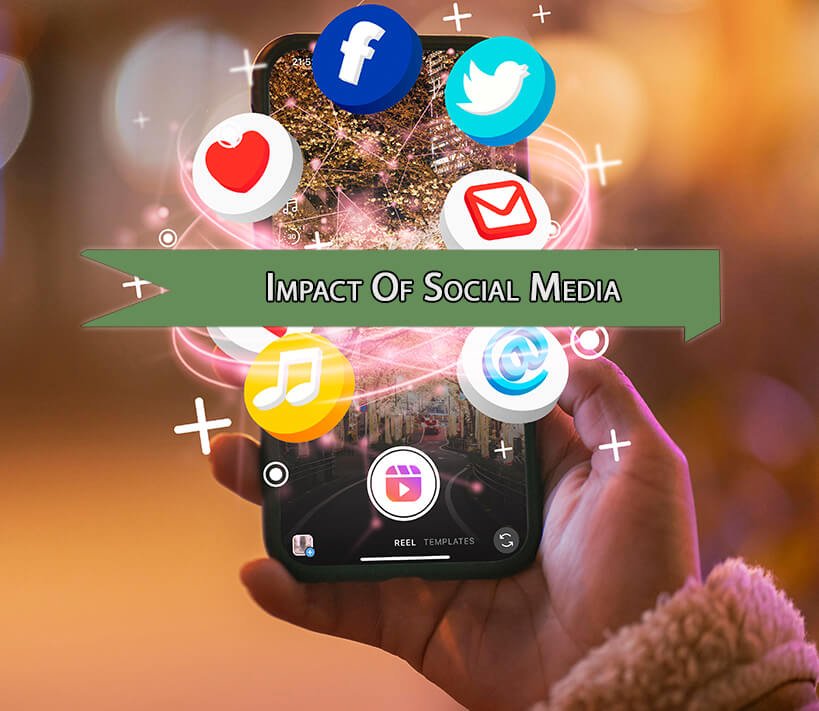In today world, a single tap can connect us with people thousands of miles away. Impact of Social media on our mental health has become a growing concern as it evolves from being just a tool to a lifestyle. Whether you are scrolling through Instagram, chatting on WhatsApp, or watching videos on TikTok, billions of people around the globe are plugged in. But as our screens light up with curated perfection, viral challenges, and instant feedback, a quiet question starts to grow louder: Are all these connections making us feel more disconnected inside?
The answer, much like the platform itself, is complex. Impact of Social Media is often described as a double-edged sword, it is used in ways that heal and hurt. In this blog, the psychoaura of social media will be explored, shedding light on how our mental health is being influenced through both empowering and concerning experiences.
The Brighter Side of Social Media
Despite the criticisms, social media has much to offer, primarily when used intentionally and mindfully.
1. A Platform for Awareness and Advocacy
Mental health has long been a whispered topic, but its awareness is growing rapidly thanks to social media. Influencers and mental health advocates have helped normalize conversations about mental health issues. Talking about anxiety, depression, or other challenges, and seeking help is no longer seen as taboo. Through bite-sized reels, people have started to learn about symptoms, and social media is playing a key role in educating the masses and helping reduce stigma. As a result, more people are reaching out to mental health professionals and can talk openly about their struggles.
2. Connection beyond Borders
Social media serves as a lifeline for those who live far from their loved ones or in isolated environments. It bridges the distance gap, allowing instant communication and emotional closeness, even when physical proximity is not possible. During the pandemic, when the entire world went into shutdown, social media acted like a window through which people could see their families, join events, and stay mentally stable during social lockdowns. Similarly, during lockdowns, social apps enable remote work and helped the education system continue through online classes.
3. Peer Support and Shared Struggles
Platforms such as Facebook groups, Instagram, and mental health forums are used to offer peer-to-peer support. The act of knowing that others might share experiences similar to yours, whether it is panic attacks or post-traumatic depression can be profoundly healing. These shared experiences are often seen as a source of comfort, and individuals are made to feel less alone in their struggles. This digital camaraderie fosters a sense of community, reminding people they are not alone in their struggles.
4. A Canvas for Creativity and Catharsis
Social Media allows users to express themselves through writing, videos, music, or art. For many, this self-expression is therapeutic. Sharing poetry about anxiety or posting art that reflects trauma can serve as an emotional outlet. Creative expression often becomes a tool for reflection and healing, especially for young people navigating complex emotions.
5. Encouragement and Validation
A kind comment, a supportive DM, or even a heart on a vulnerable post can be more potent than it appears. For those battling loneliness, encouragement received from virtual communities can significantly boost mood and self-worth. When used consciously, impact of social media is seen as a source of validation, encouragement, and emotional safety.
The Dark Side of Social Media
1. The Trap of Comparison
The endless highlight reels of others lives, perfect bodies, exotic vacations, flawless skin, can trigger feelings of inadequacy and low self-esteem. What often starts as casual scrolling gradually morphs into harsh self-judgment. This toxic comparison culture deeply feeds anxiety, insecurity, and depression, especially among teens and adults, affecting their self-image, emotional stability, and even real-life relationships over time.
2. The Pressure to Be Perfect
Maintaining an ideal online persona can be exhausting. With filters, retakes, and carefully crafted captions, users often feel pressured to present a polished version of their lives, hiding the struggles behind the scenes. This pursuit of perfectionism increases stress, burnout, and a growing disconnect between one authentic self and online identity. Over time, it can erode authenticity, diminish self-acceptance, and create emotional fatigue, as people chase validation through likes, comments, and external approval.
3. Cyber-bullying and Online Harassment
Unlike face-to-face interactions, anonymity on social media can breed cruelty. From hateful comments to targeted bullying, users especially adolescents, face emotional attacks that can lead to trauma, low self-esteem, and suicidal thoughts. Cyber-bullying is not just digital drama; it is a real-world mental health crisis.
4. Sleep Disruption and Cognitive Fatigue
For many people, late-night scrolling is a guilty pleasure. However, the blue light emitted from screens disrupts melatonin production, a hormone essential for sleep, leading to poor sleep quality. Over time, this sleep deprivation worsens anxiety, depression, and irritability, making emotional regulation even more difficult. The constant stimulation from endless content keeps the brain overly active, delaying rest and affecting overall mental and physical health. Reduced sleep also impacts memory, decision making, and daily performance, creating a cycle that hard to break.
5. The Doom Loop of Addiction
Social Media platforms are designed to be addictive. The infinite scroll, likes, and notifications activate dopamine responses, the brain reward chemical.
This addiction leads to:
- Reduced Productivity
- Neglect of real-life responsibilities
- Social withdrawal
- Constant craving for online validation
Conclusion
Social Media is like a mirror, it reflects what we bring to it. When we show up with intention and set clear boundaries, it can become a space for creativity, support, and personal growth. But when we engage with it mindlessly, without self-check, it can become a breeding ground for stress, comparison, and emotional strain. In today world, where digital connection is increasingly dominant, the key lies in how we use that connection. Social Media should be used to connect, not compare; to express, not impress. And most importantly, it should be used to uplift yourself, not unravel your mental health.




